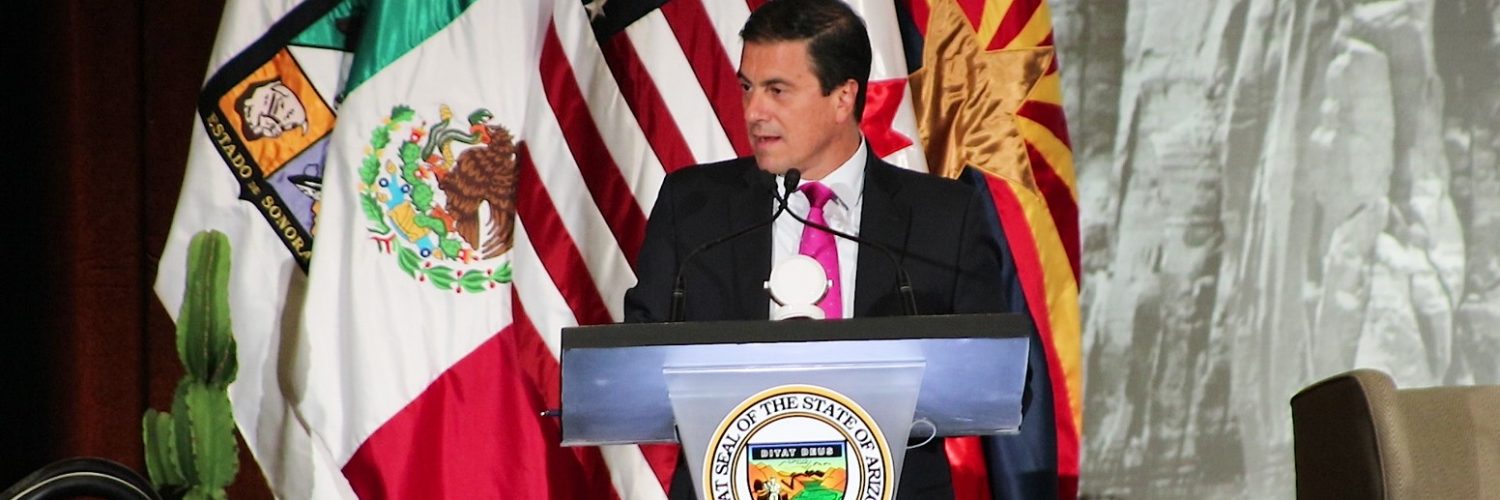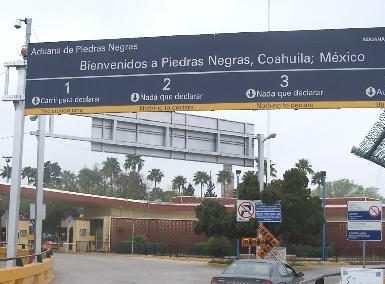The free trade relationship between America, Canada and Mexico has made it the most economically competitive region in the world.
Now, the mighty triad must ratify a new updated trade agreement to protect its standing as a global leader, the former Ambassador from Mexico to the United States Gerónimo Gutiérrez told a large crowd of business leaders and policy makers at the 60th Anniversary Summit of the Arizona-Mexico Commission in Phoenix Thursday.
“We should understand that our economic relationship today is not so much what we trade with each other or how much we invest in each other but it’s really about how we produce together to service our respective markets and export to the rest of the world,” said Ambassador Gutiérrez, who gave the keynote address.
The event brings together business leaders, company presidents, cross border trade officials and policymakers including the governors of both Arizona and Sonora, Mexico, to strategize and collaborate to strengthen cross border commerce and friendships.
Gutiérrez, who served under five Mexican presidents in the areas of finance, trade, diplomacy and national security, was instrumental in negotiating the new deal, the United States-Mexico-Canada Agreement (USMCA). It updates the 25-year-old North American Free Trade Agreement (NAFTA) for the modern, digital world.
More importantly, the USMCA will carry on its legacy as a powerful economic engine for the continent, Gutiérrez said. Mexico was the first to overwhelmingly ratify the agreement, 114-4, on June 19. Now, White House trade representative Robert Lighthizer is hoping for a similar win in the U.S. Congress.
Meanwhile, political rhetoric and the humanitarian crisis at the border have clouded the facts about the agreement and its benefits, he said.
Unique, innovative results
NAFTA, now 25 years old, has spawned not only jobs and revenues. Open trade has resulted in infrastructure projects like the world’s first geographically binational air terminal, Cross Border Xpress, that became profitable in less than two years after launch. The enclosed pedestrian skywalk bridge and terminal at Tijuana International Airport dramatically speeds up the process for crossing into San Diego.
Another project underway, Skybridge at Phoenix-Mesa Gateway Airport, will allow U.S. and Mexican officials to jointly inspect and process international shipments.
With continuation of free trade, Mexico and the U.S. can focus on trusted traveler systems, modern ports of entry with joint inspections, installations and equipment. Gutiérrez envisions the development of industrial parks, retail spaces and logistics centers at ports of entry.
“If we get the USMCA through, our trade will continue to grow and it will continue to grow very quickly,” he sid.
Continued open trade will assist energy sectors and markets to benefit both sides of the border.
“In North America we are in good shape to achieve the energy security and to complement ourselves and to have access within the region at competitive prices for different sources of energy.”
On the downside, Mexico’s energy sector is flailing. New President Andrés Manuel López Obrador has turned away from the previous administration’s motivation to seek more private investment and participation, Gutiérrez said.
U.S. and Mexico have failed on border
When it comes to global leadership, both the United States and Mexico have failed in their inability to address the migrant crisis at the border, Gutiérrez said.
The haunting photo of a Salvadoran father Oscar Alberto Martinez and his 23-month-old daughter who drowned in the Rio Grande along the U.S.-Mexican border last week is testimony to the failed policies of both countries, he said.
“Here, we’re clearly not an example of global leadership,” Gutiérrez said. “We – Mexico and the United States – simply cannot be content in our inability or unwillingness to do a better job on immigration.”
Mexico needs to work harder to slow the crush of Central American migrants flooding to U.S. borders, and U.S. policy makers need to acknowledge the true face of immigrants, he said.
“The United States has not fully realized that the (immigrants) are the people harvesting the fields, serving the restaurants and hotels, constructing houses and buildings, and, yes, programming computers and doing science as well.”
Both countries need to improve operational control of borders but in a way that is humane and does not put peoples lives at risk, he said.
“Global leadership is about doing what’s right, especially at times like this. A good number of people on both sides want our governments to do the right thing.”
Arizona-Mexico Commission 60 years strong
Since 1959 the Arizona-Mexico Commission, Arizona’s premier cross-border nonprofit organization, has led Arizona’s cross-border relations working to improve the economic prosperity and quality of life for all Arizonans through strong public and private collaborations in advocacy, trade, networking and information. For more information, visit: https://www.azmc.org/.
















Add comment